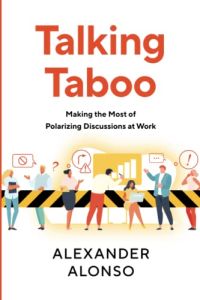Join getAbstract to access the summary!

Join getAbstract to access the summary!
Alexander Alonso
Talking Taboo
Making the Most of Polarizing Discussions at Work
SHRM, 2022
What's inside?
Learn a framework for reducing polarization in the workplace – and building empathy instead.
Recommendation
Equity expert Alexander Alonso shares insights from his investigations into workplace conflict and polarization around “taboo” topics. He references data from recent Society for Human Resource Management surveys revealing the pervasiveness of difficult, emotional and even hostile conflict at work. But Alonso urges leaders to resist shutting down discussions about controversial topics such as race, religion, abortion and gun control. Instead, firms should equip their employees with skills to engage in respectful debate. Alonso offers a framework for doing so, supported by dozens of case vignettes.
Summary
About the Author
Alexander Alonso is chief knowledge officer for the Society for Human Resource Management (SHRM). He is a founding member of the SHRM Blue Ribbon Commission on Racial Equity in the Workplace.





















Comment on this summary